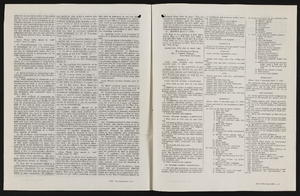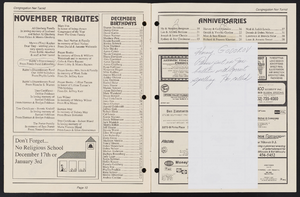Search the Special Collections and Archives Portal
Search Results
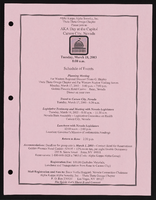
Alpha Kappa Alpha Sorority, Theta Theta Omega Chapter "AKA Day at the Capitol" schedule and supplementary resources
Date
Archival Collection
Description
From the Alpha Kappa Alpha Sorority, Incorporated, Theta Theta Omega Chapter Records (MS-01014) -- Chapter records file.
Text

Transcript of interview with Helen Smith by Emily Powers, March 4, 2008
Date
Archival Collection
Description
Helen Smith, born and raised in New Jersey, came to Las Vegas in 1956. She intended to visit relatives for a couple of weeks, but ended up staying. Her aunt convinced her to interview at Southern Nevada Memorial Hospital (SNMH) and Helen worked there for a year. She recalls three hospitals at that time: SNMH, the Eighth Street Hospital, and St. Rose de Lima in Henderson. Helen worked in the emergency room back east, so it was natural for her to start in the newly opened ER at Southern Nevada. She recalls treating many victims of accidents on the "Widow Maker", or route 95 to the Test Site, and compares the more advanced treatment and staffing back east with the Las Vegas small-town conditions. In talking about the medical advances she has seen over the years, Helen gives a detailed explanation of autoclaving, describes the duties of an ER nurse, and mentions the shifts that nurses used to work. She also discusses her own progression from relief nurse to day nurse to supervisor, and comparisons are made between hospital stays 30 and 40 years ago to hospital stays today. Helen refers to doctors and nurses that she worked with or knew of, talks about the types of things children were treated for, and shares several anecdotes and stories of patients and their treatment. She also expounds further on her work history at Sunrise Hospital, with her husband in their air-conditioning business, and as case manager for SIIS in workman's compensation. As Las Vegas grew in population, a process which started in the sixties, Helen notes that more specialists were attracted to local hospitals. She shares her own more recent experience as a patient and gives her opinion on the use of ERs for general care rather than true emergencies. Her closing remarks include descriptions of changes in nurses' responsibilities and comments on her husband's work with the Children's Shrine in telemedicine.
Text
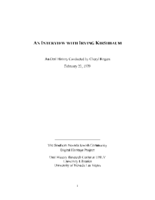
Transcript of interview with Irving Kirshbaum by Cheryl Rogers, February 23, 1979
Date
Archival Collection
Description
Interview with Irving Kirshbaum by Cheryl Rogers on February 23, 1979. In this interview, Kirshbaum discusses the Riviera Hotel where he began working in 1955. He also talks about the landscape of the Las Vegas Strip in the 1950s, and the state of gambling, comps, customer service, and dealer training. The interviewer asks about the treatment of minorities at the Riviera, and in Las Vegas generally, and the effect of corporate ownership on casinos.
Text

Interview with Louis John Vitale, May 19, 2004
Date
Archival Collection
Description
Text

Interview with Troy Ernest Wade II, June 16, 2004
Date
Archival Collection
Description
Text
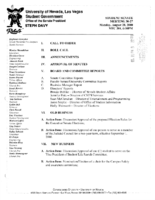
Meeting minutes for Consolidated Student Senate, University of Nevada, Las Vegas, August 28, 2000
Date
Archival Collection
Description
Text



